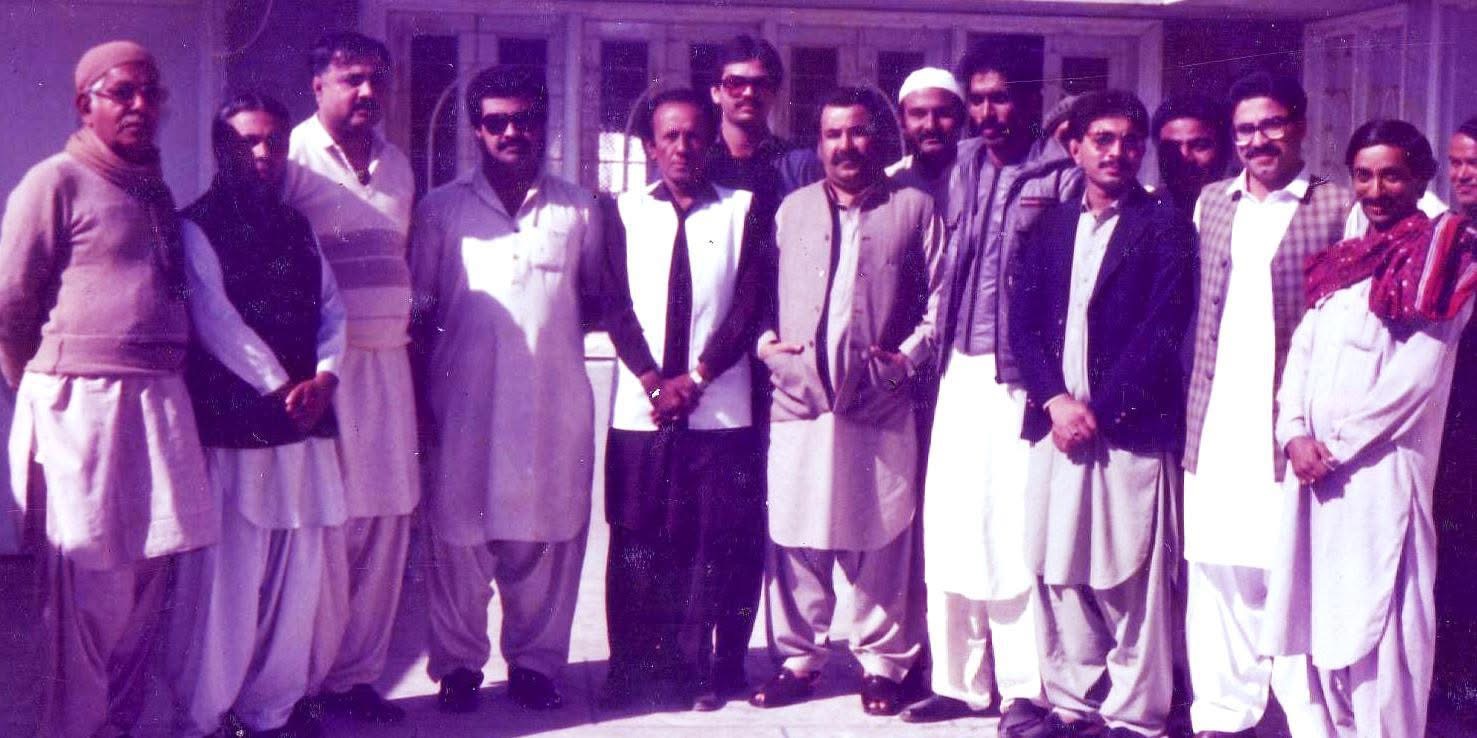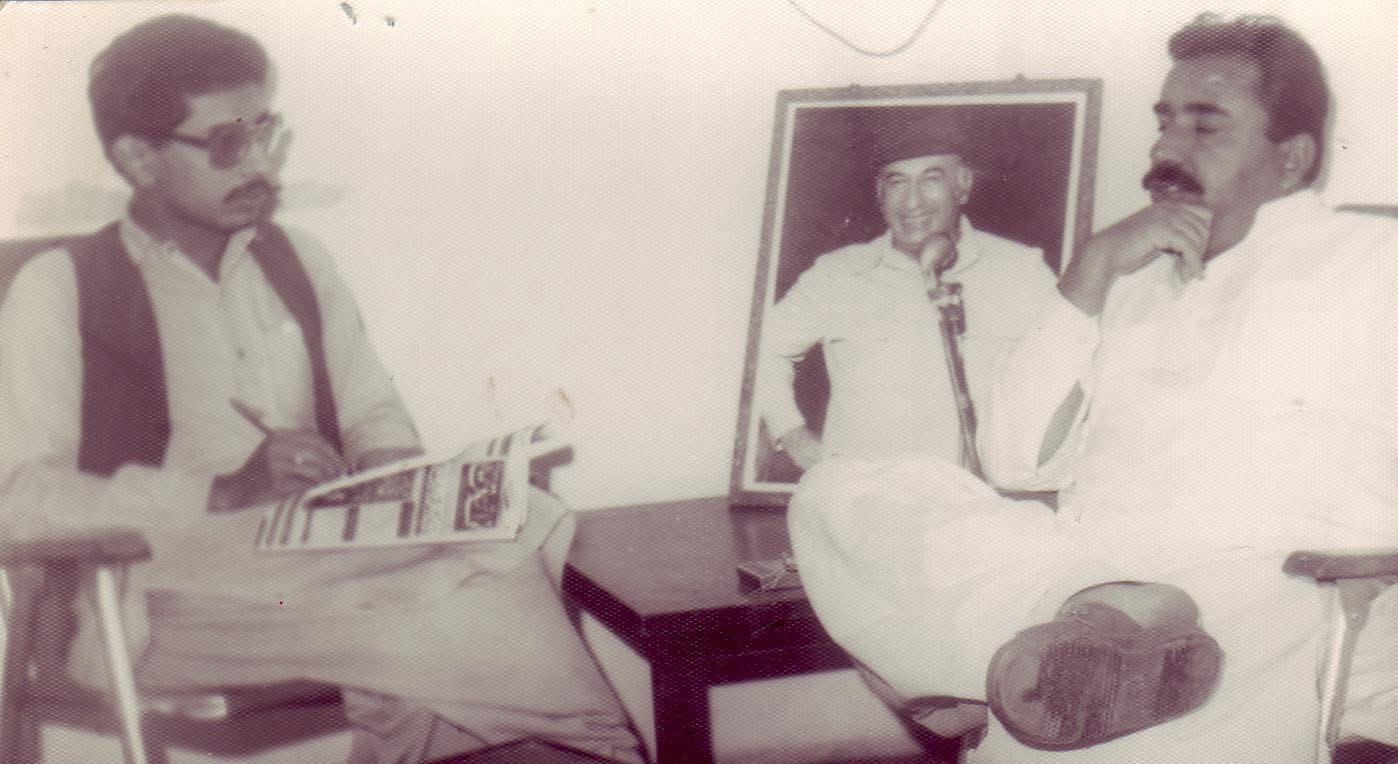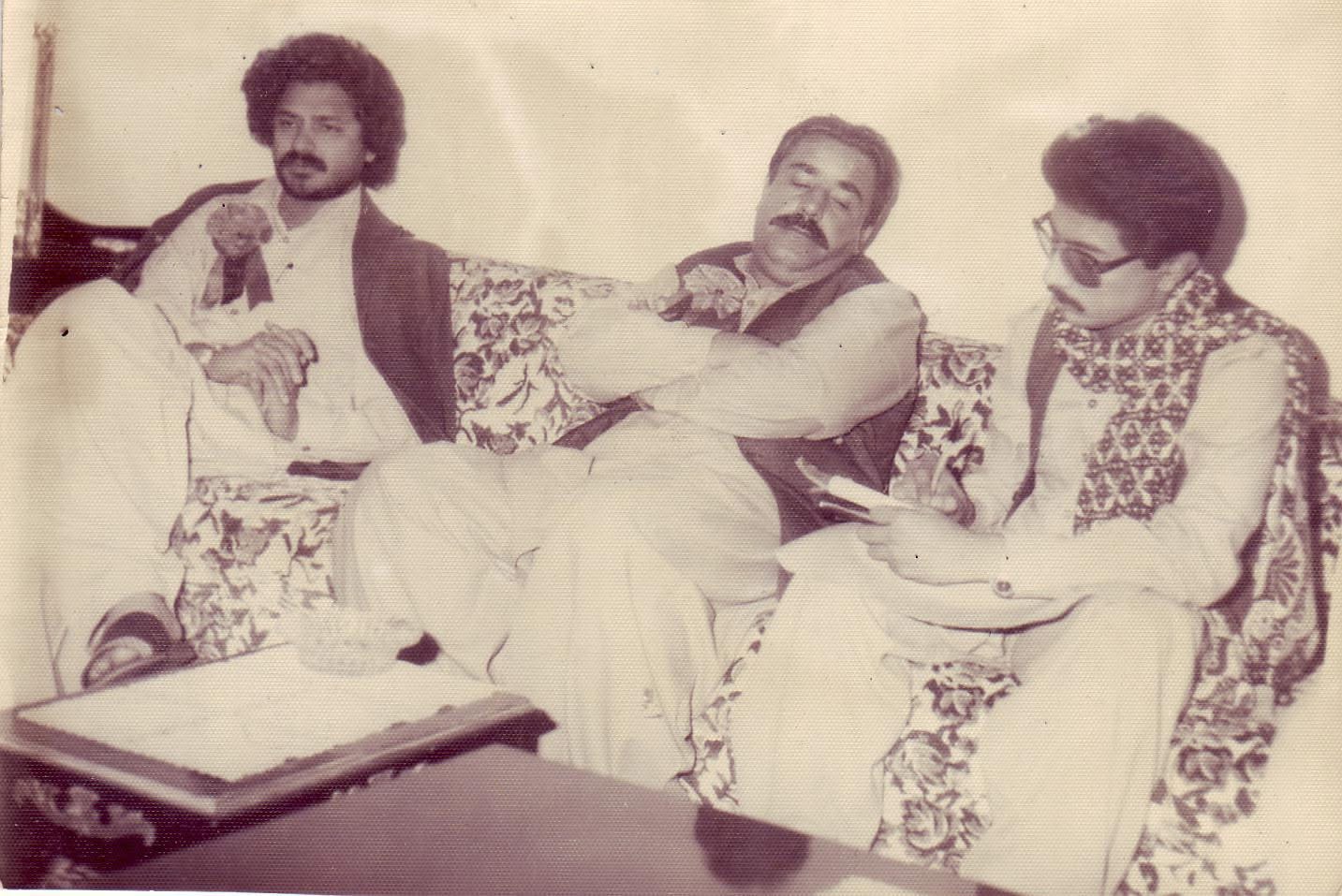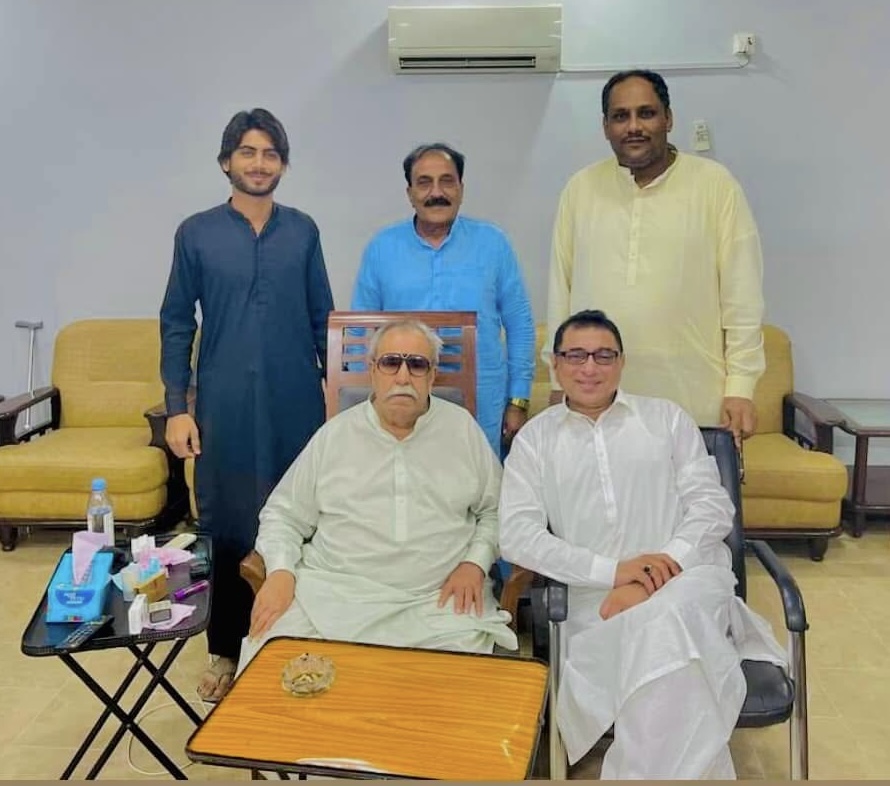The Star of Loyalty Has Set — Abdul Sattar Bachani: An Era, A Companionship, A Chronicle
By Raja Zahid Akhtar Khanzada
This is not a news report — it is a tribute, a humble offering of loyalty to that leader who was not only a respected figure in the political landscape but also a spiritual soul, known for the light of his silence even amidst the noise of power.
This isn’t just the story of Abdul Sattar Bachani, it is the story of an era. An era when politics meant service; companionship meant faith; and principles carried weight.
Today, when the news of his departure echoed in my ears, I did not see a conventional politician — I saw a flickering lamp of a 40-year bond. A light by which I recognized truth, defined journalism as responsibility, and understood friendship as a blessing.
This is no obituary,it is the tale of a political dervish, a man who carried grace in his smile and wisdom in his silence. Now that Abdul Sattar Bachani is no more, it feels as if that chapter of politics has closed — the one in which loyalty, principles, and sacrifice were written on the same page.
We first met in early 1981, when I was a young journalist. It was a modest political gathering, a few words about values, and the trust of a budding reporter… and from that moment, a bond was formed, one that matured into friendship and later, into mutual trust.
When Mohtarma Benazir Bhutto returned from exile, I was there in Lahore with her. I visited Larkana many times, became part of her political and private circles. Such was my closeness with Bachani Sahib that he would always take my words seriously. When others would dismiss my opinions, he would say,
“Wait, listen to what Raja is saying what exactly is he trying to point out?”
He used to call me “the one with foresight.”
Many times, I would disagree with decisions, and over time, those very disagreements would influence his thinking. Perhaps that’s why he valued my counsel and pondered over it with care.
Our sittings often began at 10 PM and, at times, would stretch until two in the morning.
Even after the lights dimmed in his Otaq (guest house), our circle of friends remained lively.
Abdul Latif Mangrio, Raziq Dino Sonaro, Siddiq Yousafani, Maulvi Shamshuddin Pitafi, Haji Shafi Mohammad Pitafi, Khaliq Hakro these were the permanent companions, with an occasional new face joining now and then.
It wasn’t a political meeting, nor an official consultation, it was a gathering of friends, a space where hearts spoke freely and unfiltered.
At times, I’d be part of his conversations with the manager of his buffalo farm, or during discussions about his land accounts. I would simply sit there quietly with him.
He never saw me as just a journalist, he saw me as a companion.
Often, when there was a local event, a wedding or a condolence visit, he would say:
“You’re going with me.”
And sometimes, when he’d be in the middle of a discussion and I’d try to excuse myself, saying, “You carry on, I’ll take my leave,” he would stop me with affection — and make me sit down again.
If he ever said something harsh, I would get upset. But a few days later, he would call himself and say:
“That’s enough now, let go of the resentment.”
That was the nature of our bond — sometimes bitter, but always sincere. Emotional, yet dignified.
I wasn’t just his friend — I was his political backbone.

He would take me to those secret party meetings where real decisions were made, where the curtains around conspiracies were drawn aside, where trust wasn’t measured by faces but by convictions.
Sitting beside him, I learned that politics is not merely a game of power it is an act of devotion.
A discipline that demands patience, sacrifice, loyalty, and steadfastness.
Sattar Bachani wasn’t just a politician he was one of the last flickering lamps of a generation that spoke little but honored every word.
He convinced with reason, and conquered with grace.
Today, he has fallen silent, but even his silence echoes.
An echo named loyalty, one that will continue to resound in the gatherings of friends, and breathe through the corridors of memory.
I was a journalist, a laborer of the pen, but to him, I was not merely a reporter I was a confidant.
In every meeting, every consultation, every gathering, he would tell party leaders without hesitation:
“He is my brother, nothing discussed here will ever leave this room.”
And just like that, I became part of those inner circles of the Pakistan People’s Party, those intimate settings and critical decision-making moments where only those could enter who were trusted not just by words, but from the depths of the heart.
Abdul Sattar Bachani belonged to that cadre of workers who never treated politics as a profession, but as a mission.
He was a soldier in that ideological caravan who looked beyond the destination, always focused on the purpose, who believed not in temporary gain, but in principled endurance.
His political journey began at Islamia Arabia College in Hyderabad, when he was merely a first-year student.
Yet even at that age, his ideology and insight earned him a place among fellow students like Jam Saqi and Nawab Yousuf Talpur.
He was soft-spoken in speech, but sharp in thought.
When Zulfikar Ali Bhutto first stepped onto the political stage, it was Abdul Sattar Bachani who brought him to Hyderabad even before the party had officially formed.
And when the Pakistan People’s Party finally came into being, he was among its founding members.
A testimony to his unwavering commitment and political foresight — one that needs no elaboration.
When the movement against the One Unit system gained momentum, he stood at the frontlines.

In the 1977 general elections, he was elected to the Sindh Assembly.
Then came General Zia-ul-Haq’s martial law.
And the first political worker to be arrested was none other than Abdul Sattar Bachani.
He was imprisoned in Machh — the harshest jail in Balochistan — where he endured years of torment, hardships, and the long, unjust nights of solitary confinement.
Only those who have paid the price of truth can understand the weight of those years.
In 1988, he was once again elected as a member of the Sindh Assembly, and in the political landscape of Tando Allahyar, he emerged as the voice of the poor and the middle class.
Later, he was given the portfolio of Provincial Minister for Revenue.
He never gave fiery speeches, but his actions were his greatest oration.
His words were simple, yet filled with truth.
There was no hypocrisy in him, no flattery, his personality carried the fragrance of sincerity that naturally drew hearts toward him.
In 1990, he was elected to the National Assembly and appointed as the Parliamentary Secretary for Narcotics, a sensitive federal department, now entrusted to a man of integrity and uprightness.
In 1997, he returned once again to the Sindh Assembly.
Around that time, he advised Mohtarma Benazir Bhutto to contest elections from Tando Allahyar.
She won the seat and later vacated it but that victory was another testament to Bachani Sahib’s political foresight.
In 2002, when General Pervez Musharraf enforced the graduate degree condition, Abdul Sattar Bachani was sidelined from the electoral race.
But the ideology didn’t stop.
Instead, he nominated his wife, Shamshad Sattar Bachani, as a candidate.
She won, not once, but twice — becoming a member of the National Assembly.
In 2008, she won again with a massive majority.
And in 2013, Abdul Sattar Bachani himself returned to the National Assembly, reinstating his tradition of sincere public service within his constituency.
Then in 2018, and again in 2024, his son Zulfiqar Sattar Bachani inherited his father’s seat, his ideology, and his deep bond with the people.
Today, Zulfiqar Sattar Bachani is not merely a political representative — he is the custodian of Abdul Sattar Bachani’s political legacy.
The people confirmed this bond not just through votes, but through overwhelming trust in both the 2018 and 2024 elections — proving that their connection with the Bachani family wasn’t merely electoral; it was emotional.
Abdul Sattar Bachani’s politics was never about shining on television screens.
His politics was rooted in the fragrance of the soil, in the toil of his own hands, and in the fulfillment of promises.
He personally oversaw every issue, listened to every complaint himself, and never considered the people as mere voters, he saw them as a trust.
Among his political companions were towering names such as Nawabzada Nasrullah Khan, Mehmood Achakzai, Attaullah Mengal, Asfandyar Wali, Jahangir Badar, Abdullah Shah, Khursheed Shah, Manzoor Wassan, and N.D. Khan.
These weren’t just relationships — they were proof that Abdul Sattar Bachani was not only a respected voice in Sindh’s politics but also in Pakistan’s national politics.
Today, that voice is silent.
But its echo lives on in the streets of his constituency, in the hearts of the people, and in the minds of ideological workers.
Because Abdul Sattar Bachani was never just a politician, he was an idea. And ideas never die.
That era was like a shadow, harsh, cold, and filled with silence.
Zia-ul-Haq’s martial law wasn’t just a political clampdown , it was an atmosphere where even breathing felt dangerous.
Democracy was a distant dream, and those who dared to dream were often buried within the walls of prison.
Whips, interrogations, intelligence agencies, and the constant threat of being vanished , that was the reality of the time.
And then… one day came
A day that became not just a date in history, but a symbol of courage.
An MRD (Movement for the Restoration of Democracy) meeting was to be held.
Karachi was under curfew.
Begum Nusrat Bhutto had to be taken there.
It wasn’t just a matter of safety, it was a matter of ideology.
It was about keeping the breath of democracy alive.
And that’s when Abdul Sattar Bachani’s old Mazda vehicle became a symbol of both devotion and defiance.
The back seat was removed, and Begum Sahiba was hidden inside the trunk.
The vehicle set off quietly toward the meeting.
On the way, intelligence agents stopped the car.
But Bachani Sahib’s courage, calm, and preparation stood stronger than any investigation.
Begum Nusrat Bhutto emerged from the trunk and safely entered the meeting.
As for Bachani Sahib, he was immediately sent to Machh Jail.
Four months of lashes, torture, solitary confinement.
But the ideology? It never changed.

There was imprisonment, there were sacrifices — but not a single word of complaint ever crossed his lips.
The walls of Machh Jail still stand in silent witness to how one worker laid his life on the line for his leader.
That loyalty, that closeness, that trust it was what made him not just a follower, but one of Benazir Bhutto Shaheed’s dearest comrades.
Then came a time when the question of party leadership arose.
Makhdoom Khaliq-uz-Zaman was removed from the Sindh presidency of the party.
Bachani Sahib was offered a choice friendship or position.
He chose friendship.
He called me himself and said:
“I’m resigning from the district presidency of the PPP. Please write the press release and run the story.”
I respectfully urged,
“Saeen, please wait… consider the timing.”
But his reply was simple and final:
“Raja, go ahead and publish it. I’ve made my decision.”
It wasn’t just a political decision — it was a statement of loyalty.
And when Benazir Bhutto herself came to know, she personally called Bachani Sahib and convinced him to take his resignation back.
That was his stature.
Such was his connection, no pride in rank, no hunger for status, only the greatness of character.
Time passed.
Benazir Bhutto returned to power.
In recognition of his unwavering loyalty, he was granted a permit for a sugar mill, a gift, a token of trust.
But where there is loyalty, trials often follow.
Asif Ali Zardari’s eyes turned toward the mill.
Pressure mounted.
Bachani Sahib’s brother was kidnapped.
Paths were blocked.
Eventually, the sugar mill was taken from him.
One day, I asked him:
“Do you regret losing the mill?”
He smiled, softly, yet deeply.
And then said:
“The ones who gave it… their own people took it back. It’s okay.”
No complaint. No bitterness.
That kind of grace belongs only to those who are truly loyal.
And then…
The story of Khursheed Shah is also etched into the same chapter of loyalty.
In 1988, Khursheed Shah was trying to establish his position in the party — he sought access to Benazir Bhutto.
The door opened, at the recommendation of Abdul Sattar Bachani.

Benazir Bhutto placed full trust in him.
Khursheed Shah was appointed as a provincial minister.
That moment marked how Bachani Sahib paved the way for a friend to rise, while he stepped back, and watched with joy.
That’s why, during the next government term, when Khursheed Shah became a minister and moved into the Ministers’ Colony, the keys to his old room at the Federal Lodge remained with Bachani Sahib. He handed them to me and said,
“Keep these. When friends come from Tando Allahyar, they’ll have a place to stay.”
That was his way of companionship — offering comfort, giving prayers, and quietly stepping back.
He gave others honor and space, but remained detached from positions and praise himself.
These aren’t just stories, these are layers of character that time has not been able to erase, and words cannot fully capture.
Abdul Sattar Bachani was not only a shining chapter in the history of the Pakistan People’s Party, he was among those rare workers who wore their ideology like a second skin.
For him, loyalty wasn’t a slogan, it was a way of life.
Prison, political vengeance, and the storm of public love, these aren’t just words. They are history.
When the state launched its 1992 operation against dacoits in Sindh, many innocent people were wrongfully included in the list of criminals.
Abdul Sattar Bachani’s name was also linked with those thugs and gang lords, despite having absolutely nothing to do with them.
He was arrested — a committed ideologue, a public representative, a voice of the people.
I remember clearly, when he was taken into custody, he smiled at me and said:
“Raja bhai, I’m not worried about being arrested… but this is an off-season jail — it won’t be fun!”
There was no complaint in his tone — only the same old humor and resilience — something only a truly innocent person can muster.
When he was released, the entire city of Tando Allahyar poured into the streets.
The people, the villages, the lanes, the roads — all were desperate to catch a glimpse of him.
Because the people knew that this arrest was nothing but political revenge — another dirty tactic by the Nawaz Sharif government.
But Bachani Sahib’s character soared far above such schemes.
I remember the moments when he thundered in the National Assembly.
His voice wasn’t just filled with words it carried the pain of the people.
A booming roar that echoed in defense of the weak.
His speech on the Bahawalnagar tragedy still stirs hearts to this day.
When the army in Jamshoro wrongly labeled innocent peasant farmers as dacoits and killed them,
When the widowed women of those farmers — having found no justice — set themselves on fire outside the Hyderabad Press Club…
That act of protest shook all of Sindh’s history.
It was Abdul Sattar Bachani who raised his voice in Parliament — a voice that stood like a wall of steel against injustice.
A military captain responsible for the massacre couldn’t escape Bachani’s challenge.
The case reached the Supreme Court, and justice was served.
That was his character.
A symbol of justice. A shield for the powerless.
He was a landlord, yet had the heart of a people’s comrade.
“Jeay Bhutto” was not just a slogan for him, it was the rhythm of his heartbeat.
Ideology on his lips, Benazir in his heart, and sincerity in his actions.
Abdul Sattar Bachani is no longer among us.
But his ideology, his sacrifices, his humility, and his truth still live on in thousands of hearts.
He was not just an individual , he was a generation.
A generation that has become rare now.
Today, as he departs, it’s not just one family that mourns —
All of Sindh is in mourning.
The streets and alleys where once his caravan passed, today they are silent,
As if whispering,
“The star of loyalty has set, but the sky of struggle still glows with his light.”
Abdul Sattar Bachani has passed on
But his loyalty, his grace, his sincerity lives in every heart that has ever known what it means to be faithful.
And I…
As I write all this today, these are not just words —
This is a debt to history,
An offering to a man who was the living embodiment of character, principle, and sacrifice.
Perhaps that’s why God chose to call him back on the 10th of Muharram — the Day of Karbala —
For he too stood as a wall of truth against the Yazids of his time.
May Allah bless Abdul Sattar Bachani with the highest ranks of paradise.
Inna lillahi wa inna ilayhi raji’un.





Some cherished memories with Abdul Sattar Bachani — featured here are select archival photographs, including an interview, moments from our journalistic interactions, and a final photo taken during my 2024 visit to Pakistan at his residence, where his son, Member of the National Assembly Zulfiqar Sattar Bachani, is also present.







